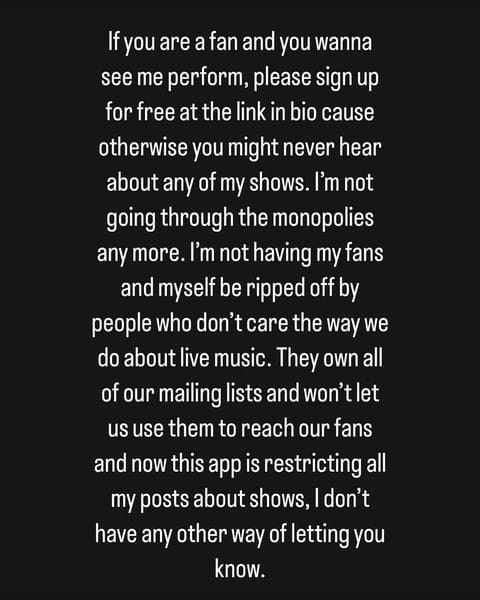Blaming algorithms is not the answer
James Blake criticises the music industry about fan data ownership and algorithm bottlenecking
If you are not a subscriber of The Fanbase Builder, join the hundreds of artists, creators, and music industry executives who receive it for free.
Let’s dive into today’s topic:
Blaming algorithms is not the answer
Artists should hold their content accountable for their success while collecting fan data on mailing lists they own.
Why it matters
Last week, James Blake shook up our timelines with his Instagram rant about the music industry, focussing on fan data ownership and algorithm bottlenecking. Even Meta's Head of Instagram responded in the comments.
The rant followed a similar series of Tweets in March (scroll down to Mar 3) about the perceived value of music.
Understanding these industry critiques is valuable, especially coming from a fellow artist. While not everyone can speak out without consequences, these discussions aim to create a better music industry.
I applaud what James Blake is doing, but I don't necessarily agree with everything he says in his statement. Let's dive in:
How it works
James Blake's rant highlights two main issues:
Data ownership: Artists often don't own their fan data, particularly from live performances. This data is typically held by promoters, venues, and ticket companies, limiting artists' ability to communicate with their audience directly.
Algorithm bottlenecking: James Blake criticises social media algorithms for limiting artists' reach.
It's crazy that artists don't own their fan data and can't email their audience after playing a show.
It should change as soon as possible. Promotors, venues, and ticket companies could allow artists to become risk-free co-promotors of their show, making them the co-owners of the data by GDPR standards.
While the data ownership point is valid, the algorithm argument requires closer examination.
It's not difficult to understand how algorithms work, typically prioritising content that evokes human response and thus generates engagement.
The analysis for content not reaching followers is straightforward: People don't care. They scrolled further because the content didn't entertain them.
The key to success lies in creating compelling content that resonates with audiences rather than blaming the algorithms themselves.
Create better, more engaging content consistently, not just during campaign periods
Provide value to fans instead of constantly requesting actions from them
Back to data ownership: Collecting fan information is just the first step. It doesn't solve the problem.
Like social media content, artists should treat email newsletters as content that should entertain.
Newsletters should be something fans want to read. Consistently, such as weekly, and providing value.
So, even when sending newsletters, artists should act as content creators. It is unavoidable.
Artists should stop selling. Stop over asking. Stop requesting fans to do things. Avoid "buy tickets", "pre-save now", and "stream this."
Instead, start entertaining. Make people stop scrolling. Evoke a response. Get them to share it with their friends.
Yes, but..
In both rants, James Blake mentions music tech start-ups. In March he mentioned member platform vault.fm, and last week he mentioned ticket platform bside.
It's important to note that tools alone won't solve these issues. Success depends more on strategy, tactics, and mindset than on specific platforms.
Take action now
Create one social media post and one email newsletter that offers pure value to fans without asking for anything in return.
Analyse the artist's current content strategy: Is it primarily promotional, or does it offer genuine entertainment and value to the audience?
Start collecting fan data through owned channels, like the artist's website.
Your thoughts
Further reading
Scattered thoughts on a big topic (@jamesblake on Instagram)
Why artist subscriptions won't save music (Water & Music)
How social media saved Linkin Park (Future Social)
What the music industry can learn from Nike's disastrous 2024 (Network Notes)
How algorithms work (The Fanbase Builder)
Five branding strategies to achieve authenticity (The Fanbase Builder)
People discover music through social media (The Fanbase Builder)



